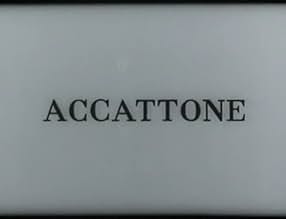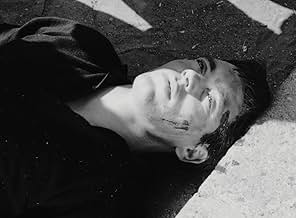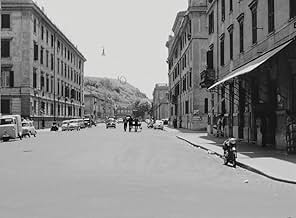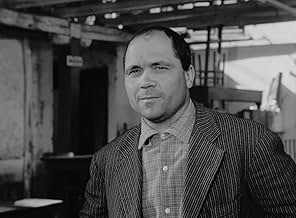IMDb-BEWERTUNG
7,6/10
10.444
IHRE BEWERTUNG
Ein Zuhälter, der seinen Lebensunterhalt auf keine andere Art verdienen kann, muss plötzlich zusehen, wie sein Leben zunehmend außer Kontrolle gerät, als seine Prostituierte ins Gefängnis ge... Alles lesenEin Zuhälter, der seinen Lebensunterhalt auf keine andere Art verdienen kann, muss plötzlich zusehen, wie sein Leben zunehmend außer Kontrolle gerät, als seine Prostituierte ins Gefängnis geworfen wird.Ein Zuhälter, der seinen Lebensunterhalt auf keine andere Art verdienen kann, muss plötzlich zusehen, wie sein Leben zunehmend außer Kontrolle gerät, als seine Prostituierte ins Gefängnis geworfen wird.
- Nominiert für 1 BAFTA Award
- 3 Gewinne & 4 Nominierungen insgesamt
Handlung
WUSSTEST DU SCHON:
- WissenswertesThis was Bernardo Bertolucci's first work in movies. He was an assistant director.
- Zitate
Vittorio "Accattone" Cataldi: Call me Accattone. There are lots of Vittorios but I'm the only Accattone.
- Alternative VersionenThe VHS and DVD versions produced by Water Bearer Films are listed as running 116 minutes, suggesting that this print is four minutes shorter than the original release.
- VerbindungenEdited into Red Italy (1979)
- SoundtracksSt Matthew Passion
Composed by Johann Sebastian Bach
Ausgewählte Rezension
Accattone is a Roman pimp who lives off his girlfriend Maddalena's earnings. Pasolini's cheeky aim is to put forward this young man as a modern saint. To this end he lathers Bach's St Matthew's Passion (inspired by the Apostle's experience of the crucifixion of Christ) over scenes of Accattone's life. Indeed in one of Accattone's first scenes he's shown devouring a slice of tomato, displayed horizontally as if a cardinal's galero, whilst an sculpture of perhaps a guardian angel can be seen over his shoulder in the distance (an anti-clerical pro-Christ stance seems to be a consistent theme for Pasolini). Later, a prophecy regarding Accattone's descent is eerily similar to Christ's pronunciation of Peter's forthcoming triple renunciation.
The film reminded me of a DH Lawrence poem (elliptically titled Democracy):
"I love the sun in any man / when I see it between his brows / clear, and fearless, even if tiny // But when I see these grey successful men / so hideous and corpse-like, utterly sunless, / like gross successful slaves mechanically waddling / then I am more than radical, I want to work a guillotine
...
I feel that when people have gone utterly sunless / they shouldn't exist."
Whatever Accattone is, he's not sunless; when he tries out the world of work (legitimate work involving labour), he becomes Vittorio, his Christian name, and the light goes out. The film reminds me very much of Fassbinder's Gods of the Plague in that sense, young men with brio but no skills or education who, given the choice, between drudgery or crime, choose crime. Both films polemicise against urban post-industrial capitalist societies, which have become increasingly removed from the milieu in which humanity evolved and is "designed" to cope with. When Accattone compares the chore of lifting rolls of iron with the horrors of Buchenwald the film goes a little over the top.
Of course someone viewing Accattone and his friends through less of a haze of desire than the director might think that they were just a bunch of jerks. Undeniably though, Pasolini is a great poet, and there's evidence of things to come here, the film whilst looking largely Bertoluccian (he was the assistant director), has the occasional master shot, for example the rolling hills and valley in the dream sequence, par with Leonardo in quality of composition and symbolism; the countryside here representing an idealised rural precursor to Accattone's slum existence.
I also applaud Pasolini for taking his arguments beyond class, Accattone's group of spongers contains educated men as well as dunces, and they are equally disdainful of the ruling class as they are of proletarians.
The film reminded me of a DH Lawrence poem (elliptically titled Democracy):
"I love the sun in any man / when I see it between his brows / clear, and fearless, even if tiny // But when I see these grey successful men / so hideous and corpse-like, utterly sunless, / like gross successful slaves mechanically waddling / then I am more than radical, I want to work a guillotine
...
I feel that when people have gone utterly sunless / they shouldn't exist."
Whatever Accattone is, he's not sunless; when he tries out the world of work (legitimate work involving labour), he becomes Vittorio, his Christian name, and the light goes out. The film reminds me very much of Fassbinder's Gods of the Plague in that sense, young men with brio but no skills or education who, given the choice, between drudgery or crime, choose crime. Both films polemicise against urban post-industrial capitalist societies, which have become increasingly removed from the milieu in which humanity evolved and is "designed" to cope with. When Accattone compares the chore of lifting rolls of iron with the horrors of Buchenwald the film goes a little over the top.
Of course someone viewing Accattone and his friends through less of a haze of desire than the director might think that they were just a bunch of jerks. Undeniably though, Pasolini is a great poet, and there's evidence of things to come here, the film whilst looking largely Bertoluccian (he was the assistant director), has the occasional master shot, for example the rolling hills and valley in the dream sequence, par with Leonardo in quality of composition and symbolism; the countryside here representing an idealised rural precursor to Accattone's slum existence.
I also applaud Pasolini for taking his arguments beyond class, Accattone's group of spongers contains educated men as well as dunces, and they are equally disdainful of the ruling class as they are of proletarians.
- oOgiandujaOo_and_Eddy_Merckx
- 11. Juni 2011
- Permalink
Top-Auswahl
Melde dich zum Bewerten an und greife auf die Watchlist für personalisierte Empfehlungen zu.
- How long is Accattone?Powered by Alexa
Details
Box Office
- Weltweiter Bruttoertrag
- 2.865 $
- Laufzeit1 Stunde 57 Minuten
- Farbe
- Sound-Mix
- Seitenverhältnis
- 1.37 : 1
Zu dieser Seite beitragen
Bearbeitung vorschlagen oder fehlenden Inhalt hinzufügen

Oberste Lücke
By what name was Accattone - Wer nie sein Brot mit Tränen aß (1961) officially released in India in English?
Antwort































